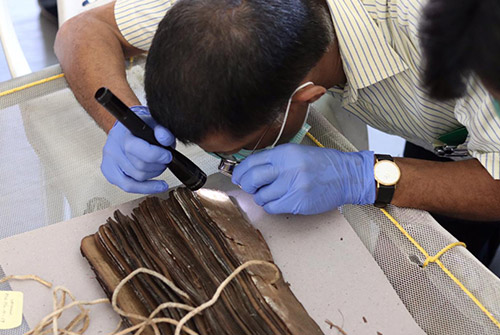First ICCROM Training in Ireland Welcomes Non-Heritage Professionals
The course First Aid to Cultural Heritage in Ireland took place in Dublin from 14 to 16 February. The Irish National Committee of the Blue Shield (INCBS) planned the training to build awareness and capacity in the lead-up to Ireland's ratification of the 1954 Hague Convention on the Protection of Cultural Property in the Event of Armed Conflict. Heritage professionals participated alongside those from non-heritage sectors, including military and emergency services personnel.
Generous funding from the Heritage Council of Ireland and the Dublin Port Authority, combined with the support of the National Museum of Ireland, gave ICCROM the opportunity to deliver its first training course in Ireland.
Bilingual Course Highlights Mali’s Rich Cultural Context
First Aid to Cultural Heritage in Times of Crisis (FAC), held in Bamako, Mali, 12–30 November, trained 21 professionals from 18 countries and included a special module on using cultural heritage first aid and recovery for conflict transformation.
Using the recent conflict in Mali as a central case study, this course offered insights gained in recovering cultural heritage in tandem with humanitarian recovery. Participants gained first-hand experience interacting with communities engaged in recovery, reconstruction and peace building processes. The rich cultural and social context of Mali provided participants with a unique opportunity to understand the complex links between people and heritage during crises.
UNESCO and ICCROM organized the training. National and international partners included the Ministry of Culture, National Museum of Mali, National Library, Malian Red Cross, National Army of Mali, Civil Protection, International School for Maintaining Peace, International Committee of Red Cross and UN Peacekeeping Mission in Mali (MINUSMA).
Japan ITC Examines Integrating Disaster Protection for Immovable and Movable Cultural Heritage
The overall theme of the 13th International Training Course (ITC) on Disaster Risk Management of Cultural Heritage, held in Kyoto and Kobe, Japan, from 29 August to 20 September, was “Towards Integrated Protection of Immovable and Movable Cultural Heritage from Disasters.” Japan is home to frequently occurring disasters, which can damage its tangible and intangible cultural resources in a variety of ways. To protect these resources, the country has taken specialized measures in establishing a disaster risk management system and methodology for post-disaster emergency response and recovery. This training, which benefited 15 participants from 13 countries, covered cultural heritage disaster mitigation measures, many developed in response to Japan's special circumstances.
As part of the ITC, a one-day public symposium addressed the topic “Working with the Local Communities on Disaster Prevention for Cultural Heritage: The Experiences of the World and the Future of Japan.”
Course partners included ICCROM, ICOMOS, UNESCO and the Japanese National Institutes for Cultural Heritage, together with Ritsumeikan University.
Nature-Culture Linkages in Asia and the Pacific Are Focus of Tsukuba CBWNCL
The Capacity-Building Workshops on Nature-Culture Linkages in Asia and the Pacific (CBWNCL) develop new approaches towards integrated conservation of cultural and natural heritage that focus on theory and practice in the Asia and the Pacific Region. The workshop series started in 2016 as part of the World Heritage Capacity-Building Programme led by ICCROM and IUCN, in consultation with ICOMOS and the UNESCO World Heritage Centre.
The theme of CBWNCL 2018, held at the University of Tsukuba, Japan, between 21 September and 1 October, was “Disasters and Resilience.” At the workshop, 15 participants from 14 countries explored nature-culture linkages in the context of disaster preparedness, response and recovery. Through shared experiences and case studies, the workshop raised awareness about a region that is increasingly vulnerable to disasters but also strong in resilience and recovery experience.
The UNESCO Chair on Nature-Culture Linkages in Heritage Conservation at the University of Tsukuba organized the event in cooperation with the UNESCO World Heritage Centre, IUCN, ICCROM and ICOMOS.
ICCROM-Sharjah Facilitates Khartoum Risk Management Workshop
From 13 to 15 April, ICCROM-Sharjah conducted a site visit and Risk Management and First Aid Course workshop in El Obeid and Khartoum, Sudan. The workshop was a follow-up to an ICCROM Risk Management Leadership course held in October 2016.
ICCROM-Sharjah facilitated the training, with support from the Prince Claus Fund.
Brabant FAC Course Shares Methods for Rescuing Heritage in a Disaster
ICCROM’s flagship First Aid to Cultural Heritage (FAC) course in Brabant, Netherlands, held 6–24 August, trained 24 heritage and first response professionals from 23 countries to be “cultural First Aiders,” skilled at the protection of cultural heritage in emergency situations.
Course modules addressed prevention, safe evacuation, stabilization and protection for cultural heritage at risk. Participants further learned about damage and risk assessment, setting priorities, negotiating with local authorities and crisis communications. These cultural First Aiders then returned home to share the training, ensuring that their communities are fully involved in the recovery of their own heritage.
A disaster simulation given on 22 August, comprising a fictitious fire event at an ethnographic museum, gave participants a chance to test their skills as they attempted to safeguard museum collections while negotiating for access with firefighters still battling a blaze. The event drew wide media coverage in the Netherlands and internationally to raise public awareness and spur interest about the importance of heritage protection and recovery.
Collaborating partners included ICCROM, the Prince Claus Fund’s Cultural Emergency Response Programme (CER), Smithsonian Institution and the Netherlands Commission for UNESCO.
Inaugural FAC Leadership Workshop Strengthens Heritage First Aid Networks
The first Leadership in First Aid to Cultural Heritage in Times of Crisis (FAC) workshop, held 25–31 August in Brabant, Netherlands, engaged 14 FAC alumni from 12 countries to foster the creation of sustainable national or regional networks and strengthen capacity for integrating heritage rescue operations with humanitarian relief during disaster situations. Experts coached participants in identifying financial and other resources to support preparation and planning. They also worked together to identify and strategize next steps for integrating and implementing cultural first aid principles and methods. The workshop was co-organized by the Prince Claus Fund, the Smithsonian Institution, ICCROM and UNESCO Netherlands.
